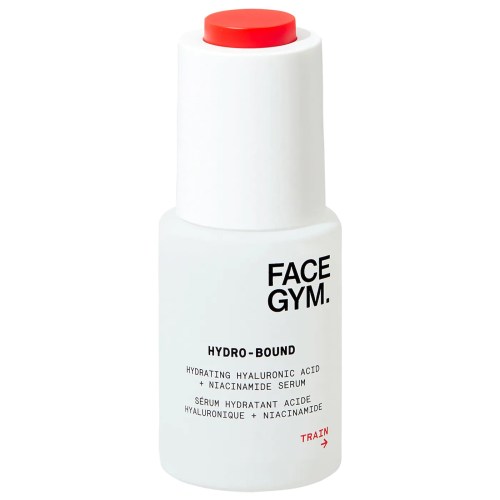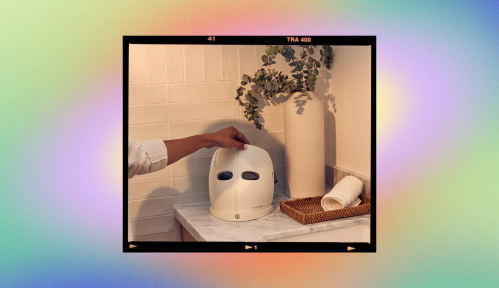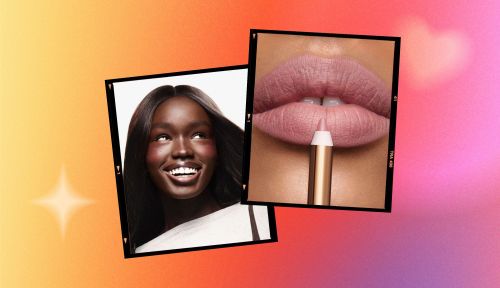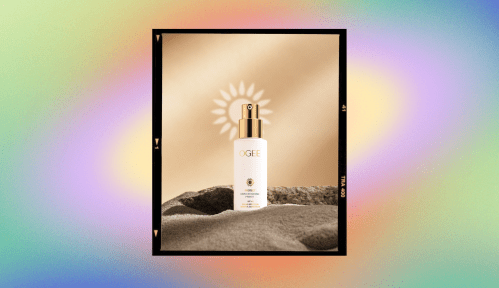Our editors independently select these products. Making a purchase through our links may earn Well+Good a commission
I’ve Been Through 10 Bottles of This Ultra-Hydrating Serum That’s Got Me To Stop Wearing Makeup Almost Entirely—And It’s Back in Stock
FaceGym Hydrobound Daily Serum is made with polyglutamic acid, an ingredient that's 4x more hydrating than hyaluronic acid.

Haven’t you heard? Polyglutamic acid is the buzzy hydrating skin-care hero in town that’s even more effective than hyaluronic acid. The potent active is finally getting the spotlight it deserves, and just so happens to be the key ingredient in the product I’ve been screaming about from the rooftops to anyone who will listen: FaceGym Hydrobound Daily Serum ($80). Trust me—this is one product (and ingredient) worth knowing about. Keep reading to find out more.
What is polyglutamic acid?
“Polyglutamic acid (PGA) within skincare is a biopolymer first discovered in jellyfish that prevents tissue dehydration in salt water. Nowadays it’s sourced via fermentation,” says Krupa Koestline, cosmetic chemist and founder of KKT Consultants. It’s actually found in natto, a sticky Japanese dish made from fermented soybeans (which is the same way it’s sourced for skin care).
The ingredient acts as a humectant, like hyaluronic acid, drawing in water to keep skin hydrated and maintain its moisture barrier over long periods of time. Cara Bondi, a cosmetic chemist who has worked with beauty brands like Tata Harper Skincare, Ursa Major, and Sol De Janeiro, notes that polyglutamic acid also smooths the appearance of wrinkles, increases moisture retention, softens skin, and evens skin tone.
The biggest difference between hyaluronic acid and polyglutamic acid is their molecular weight, which has an effect on their effectiveness to hydrate the skin. Polyglutamic acid molecules are larger than hyaluronic acid molecules, which means they stay on the surface of your skin to create a sort of film that locks in water. Of course, both ingredients are effective humectants (there’s a reason why HA is so beloved), but polyglutamic acid works just a little bit harder.
“Polyglutamic acid holds 4,000-5,000 times its weight in water. Hyaluronic acid is usually cited as 1,000 times its weight in water,” says Bondi. However, while polyglutamic acid is more effective, it’s a lot more expensive to source. According to derms, this is why we don’t often see the ingredient marketed. If you do, it will be more pricey than your trusted hyaluronic acid serum; around $60 – $70 dollars.
The polyglutamic acid serum that transformed my skin

FaceGym, Hydro-Bound Hyaluronic Acid + Niacinamide Serum — $77.00
The larger, 30 mL (or 1 oz.) bottle is back in stock for $77.
Both of these powerhouse ingredients are present in Face Gym’s Hydrobound serum, which means you’re getting a double dose of hydration. Plus, it’s got niacinamide, which means the formula offers a trifecta of skin-perfecting, nourishing, and smoothing ingredients.
The combination of polyglutamic acid and multi-molecular Ha4 (hyaluronic acid) in Hydrobound delivers hydration and helps the skin naturally produce its own hyaluronic acid, improving skin elasticity and softening fine lines. “Polyglutamic acid is ideal for those with dry or dehydrated skin,” says Kim Nichols, MD, board-certified dermatologist and founder of NicholsMD in Greenwich, CT. Hydrobound also contains a bio-lifting complex that works with niacinamide to firm skin and rebuild damaged areas of the skin barrier.
It’s hard to play favorites when you’re a beauty editor but when you go through a bottle of a specific skin-care product every month, despite having endless choices, you tend to notice. Hydrobound is so good, it’s the only product that I religiously order and simply can’t live without.
Lifetime to date, I’ve been through about 10 bottles of this serum. The first few were gifted (thank you) but then I realized couldn’t be without this precious formula ever again, so I started buying multiple at a time. I love it because it’s lightweight, and almost feels like water on your face. In addition to the longterm hydration benefits it offers, I can instantly see it quenching my skin every time I apply. In the past year I’ve been using this serum, I’ve never received more compliments on how my complexion looks. I’ve gone makeup free almost every chance I get and my skin looks and feels healthy and clear–not at all dehydrated. I give this serum a 10 out of 10, and will keep buying it until they no longer stock the shelves with it.
Sign up for the Well+Good SHOP Newsletter
Get exclusive deals on wellness, beauty, fitness, and food products that have been hand-picked by our editors.
Got it, you've been added to our email list.










